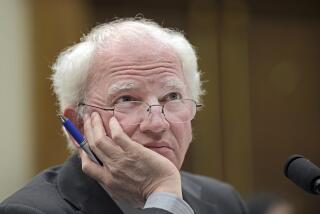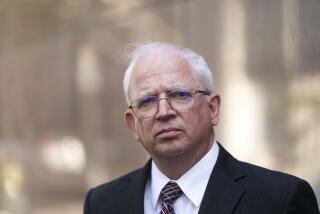Stephen Glass, disgraced journalist, seeks California law license
Paul Zuckerman was sifting through resumes when he paused, “astounded,” over a particularly strong applicant for a law clerk opening: Ivy League undergraduate, top-notch law school, legal work for two judges in Washington.
Zuckerman’s Los Angeles County firm handled personal injury cases — auto accidents and slip-and-falls. He figured the applicant, whose credentials marked him for a prestigious “white shoe” firm, had applied to the wrong place. Then he read the cover letter.
Stephen Randall Glass wrote that he was a disgraced former Washington journalist. While in his mid-20s, Glass had blistered prominent people and organizations in articles he fabricated for the New Republic and other magazines, then engaged in elaborate frauds to conceal his deceit. Zuckerman remembered the scandal. “Shattered Glass,” a movie, had been made about it.
“What a liar,” Zuckerman remembers saying, and hit the delete button.
Now, eight years later, Zuckerman not only supports Glass but would like to eventually make him a partner.
Whether Glass becomes a lawyer will be up to the California Supreme Court, which must determine if he has rehabilitated himself. Lawyers may spin their client’s story but are supposed to adhere to fact. The justice system is a search for truth, and clients depend on the veracity of their lawyers.
The State Bar of California wants him kept out of the legal profession. The bar told the high court that Glass, a “pervasive and documented liar,” had “tainted the entire journalism community.”
Now 39, Glass lives in a small, rented home near Silver Lake with his longtime girlfriend, three cats and a beagle named Eugene. He has spent years in therapy and poured hundreds of thousands of dollars into his quest for a law license. He declined to be interviewed but insisted during sworn bar testimony in 2010 that he is a changed man.
He described growing up in an affluent Chicago suburb with parents determined to see him and his younger brother succeed. His father, a gastroenterologist, was rageful, Glass said. His mother, a nurse, was so obsessed with order that she discouraged the brothers from opening the meticulously organized refrigerator — apples on the left, oranges on the right.
Glass said his parents hired tutor after tutor, drilled him for tests and banished him to his bedroom if he answered incorrectly. When Glass misstepped, his mother froze him out and lavished attention on his brother. Glass testified that his brother, who became estranged from their parents, got similar treatment.
After graduating from college, Glass landed a job at the New Republic magazine and enrolled in night classes at Georgetown law school. He said his parents considered journalism frivolous, the law “a garbage profession,” and constantly pressed him to go to medical school.
Fearing he would “wash out” at the New Republic, Glass enlivened his articles by concocting quotes and anecdotes. His colleagues unknowingly praised the fictitious parts. He began fabricating more and more, “like doubling down at a casino,” he testified.
Glass wrote 42 magazine stories that were wholly or partially fabricated. He made up phony notes, a fictional website, fake business cards and bogus voice-mails to cover up. He had his brother pose as a source to fool a suspicious editor.
Among the lies was a profile of Vernon Jordan, former head of the National Urban League and a friend of Bill Clinton. Glass invented quotes portraying the lawyer as a lecherous fool who made unwanted advances to women, a portrait that still rankles Glass’ critics. A now-defunct magazine, George, published the fakery.
By the time Glass was caught in 1998 — a reporter for online Forbes tried to match the reporting on one of Glass’ stories and could not locate the subjects — he was 25 and on track to earn $100,000 a year. He was fired and entered the day program at Georgetown law school.
Georgetown law professor Susan Low Bloch met with Glass after his firing and believes he was tormented before being caught. “I think he was relieved when he crashed,” she said. He struck her as “very, very anxious to please,” intense and prone to speaking rapidly, “very New Yorky,” despite his Chicago roots.
She hired him as her research assistant, making him promise “under absolutely no circumstance” to lie. His work was “absolutely outstanding,” and she recommended him for posts with two judges she informed of his past and who later “became part of his fan club.”
Glass moved to New York, underwent psychoanalysis and wrote an autobiographical novel, “The Fabulist,” which portrayed journalists as unscrupulous. The main character, named Stephen Glass, fabricated stories and was caught. Glass earned a net $140,000 from the book, according to his legal brief.
He also wrote letters of apology to those he duped and defamed. A former editor who received one called it perfunctory.
Glass passed the New York bar examination and applied for a law license in 2004 but withdrew after learning he would be rejected on moral grounds. He moved with his girlfriend, a lawyer and writer, to California and sent out nearly 100 resumes.
Glass’ resume did not stay in Zuckerman’s delete file for long. Zuckerman said he reflected on his own descent into substance abuse and his recovery with a 12-step program. “Who was I to deny the guy a second chance?” Zuckerman said. He invited Glass for an interview.
Going in the next day, Glass wore a suit and tie too formal for Zuckerman’s casual firm. He explained at length his published lies, his infamy and his efforts to come to terms with his past in psychoanalysis. Zuckerman had counseled lots of alcoholics and saw Glass as “a guy who had a spiritual change.”
Zuckerman hired Glass in 2004 but watched him closely. The lawyer recalled spotting Glass one day outside their office. Shame hobbled him, Zuckerman said. “Even from the across the street, you could see the weight of the world on his shoulders.”
Glass, who told co-workers and clients about his past, started with menial tasks, drafting “demand letters” for injured clients. He excelled and eventually was drafting the firm’s most complex motions. Zuckerman said Glass never misrepresented a legal precedent and championed the firm’s most unfortunate clients, even helping them on his days off.
In 2009, the California bar denied Glass a law license. He appealed, and a 10-day confidential bar trial was held. Glass summoned law professors, employers, friends, the former owner of the New Republic and even his psychiatrists to attest to his newfound honesty and ethics.
One psychiatrist testified that Glass had fabricated because his development had been arrested. He was “struggling with adolescent issues,” the doctor said. Another described Glass’ prevarications as akin to compulsive gambling. Both expressed confidence he would not relapse.
Glass’ former editors countered by describing him as a manipulative con man who ingratiated himself with people and plumbed their prejudices and weaknesses. Glass testified that he fabricated for love and wanted his editor “to love me, like I wanted my father to love me.”
The bar judge ruled for Glass, and a review panel upheld the decision 2 to 1. The bar committee in charge of licensing appealed to the California Supreme Court, noting that Glass had not disclosed all his fabrications until his California application and had inaccurately told the New York bar he had helped all the magazines identify his falsehoods.
The court accepted the case in December. His confidential bar files were opened and his licensing blocked. No hearing date has been set.
In weighing a controversial applicant, the state high court has stated that the greater the sins, the more proof of rehabilitation needed. The court denied a former addict a law license 12 years ago because he failed to disclose all previous convictions on his bar application and had been delinquent in handling traffic citations. That applicant had served prison time for killing his sister in a drug-addled rage decades earlier.
Glass’ misdeeds, though less serious, were higher profile.
Some legal ethicists, including Stanford University law professor Deborah Rhode, believe Glass should get his law license. Others, including New York University’s Stephen Gillers, believe otherwise.
“What grates me is the idea that he is not honorable enough for journalism, so let the lawyers have him,” Gillers said. “Why should the legal system bear the risk?”
Zuckerman said Glass has grown comfortable with himself. He no longer keeps his distance and persuades clients to open up by revealing his past misdeeds. Zuckerman estimated Glass works nearly 70 hours a week and has earned more than $150,000 a year.
Glass, a vegan, is also passionate about animal rights, Zuckerman said. He helps an animal rescue group and often takes his beagle to the office. He works out regularly, reads voraciously — Philip Roth is a favorite — fervently follows politics and loves movies. He even has performed with a comedy troupe in Los Angeles. He and his girlfriend have said they won’t marry until same-sex couples can legally wed in California.
If the court rejects Glass, he may reapply in two years. In any case, he will have to retake the bar exam, which must be passed no more than five years before certification. Zuckerman said Glass has never discussed what he will do if he loses.
“People can say he is fooling me,” Zuckerman, 47, said. “But I truly know the man.”
More to Read
Sign up for Essential California
The most important California stories and recommendations in your inbox every morning.
You may occasionally receive promotional content from the Los Angeles Times.











